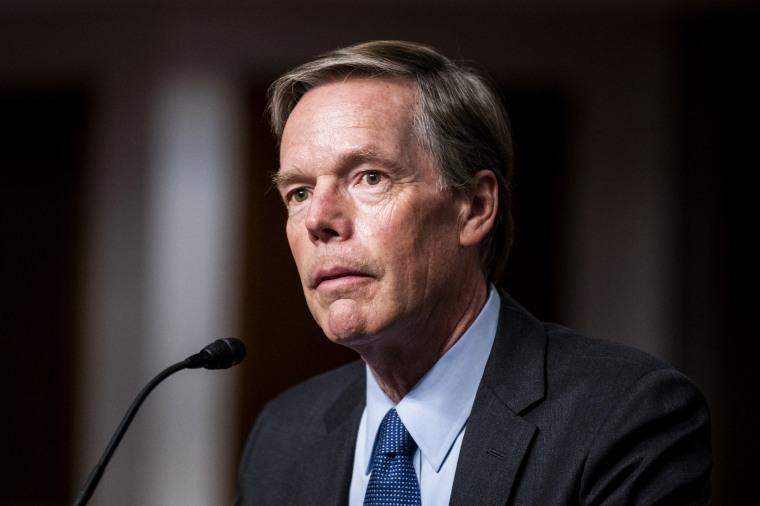美驻华大使呼吁中美恢复对话,美媒:拜登政府急了
(观察者网讯)据美国有线电视新闻网(CNN)当地时间2日报道,美国驻华大使伯恩斯称美国从未打算“冰冻中美关系”,随时准备好与中国举行高层对话,希望能在两国间建立更好的沟通渠道一事上与中方达成共识。
全国广播公司(NBC)称,伯恩斯的发言是迄今为止“最明确的信号”,显示出拜登政府对恢复中美对话的“渴望”。
当地时间周二,美国驻华大使伯恩斯通过视频连线出席华盛顿智库史汀生中心(Stimson Center)座谈会。他在会上表示,美国已经准备好与中国举行高层会谈,并希望能在这一问题上与中方达成共识。
伯恩斯说,中美关系仍是复杂又充满竞争性的,但华盛顿不寻求与北京发生冲突,并相信更多的对话将会是建设性的,两国政府之间需要更好且更深入的沟通渠道。
伯恩斯还称,美国务卿布林肯原定于今年2月但一再推迟的访华行程将被重新安排,“当他的访问条件合适时。”
但他表示,目前仍无法预测中美两国何时会同意重新安排此次访问,也无法预测其他美国政府官员与中方官员之间的会晤情况,“我们真正需要的是政府高层更广泛的接触,美国已经为此做好准备,希望中方也准备好了。我们从未支持冰封中美关系。”
伯恩斯称,在中美关系出现问题时,保持对话沟通尤为重要,“我们从不避讳对话,我们希望中国在这个问题上与我们是相向而行的。”
另据路透社报道,伯恩斯在会上还提到美国应与中国增加学生交流,称这符合美国的国家利益。
他表示,美国年轻人应该学习中国的语言、文化和历史,这样才能在日后任职于政府部门时对中国有更好的认识,正如他被任命为驻华大使后便给自己定下了学习中文的目标。
伯恩斯声称,中国过去3年严格的疫情防控措施“阻碍”了两国人员接触,如今管控措施悉数取消,希望各项正式和非正式交流都能恢复如初,“在过去三年里,两国社会出现了脱节,这不健康也不明智。”
NBC称,美国驻华大使的言论是迄今为止“最明确的信号”,表明在中美关系紧张局势下,拜登政府渴望与中国恢复更广泛的对话。
尽管伯恩斯表达了美方对恢复中美对话的迫切,但其发言还是将对话中断的责任怪在中方头上。
伯恩斯虽一再称中美建立和加强可靠的沟通渠道很有必要,但同时又声称自时任国会众议长佩洛西窜台、“流浪气球”事件后,中国暂停了与美沟通的许多重要渠道,美方多次呼吁重启对话无果。
话里话外都是中方对美方不予理睬,却只字不提明明是美方挑衅炒作在先,中方才做出相应反应。
4月11日,中国外交部发言人汪文斌在记者会上指出,当前中美关系遭遇困难,责任不在中方。
他表示,美方应停止干涉中国内政,停止损害中国利益,停止一边声称要为中美关系加装“护栏”、一边破坏两国关系的政治基础,(应)同中方相向而行,推动中美关系重回健康稳定发展正轨。
在布林肯于G7外长会上发表“中国必须表现出继续与美国接触的意愿”等荒谬言论后(18日),汪文斌再度回应表示,中国始终按照相互尊重、和平共处、合作共赢三原则,看待和发展中美关系。当前中美关系紧张的根源,在于美方基于错误的对华认知,制定和执行错误的对华政策。
中国始终对中美对话持开放态度,希望能够和美国加强高层对话,但是美国却做出各种对华充斥着敌意的行为,此举才是真正在破坏中美对话的环境。
4月21日,中国前驻美大使崔天凯在“中国式现代化与世界”蓝厅论坛指出,中美进行对话有两个前提条件,分别是尊重彼此和言而有信,“不对话肯定解决不了问题。但对话如果没有诚意,不能平等相待,也不见得能解决问题。”
U.S. ambassador to China says the U.S. is ready for high-level talks with Chinese
The U.S. relationship with China remains “complicated” and competitive, but Washington does not seek conflict with Beijing and believed more dialogue would be constructive, said U.S. Ambassador Nicholas Burns.
“Our view is we need better channels between the two governments and deeper channels, and we are ready to talk,” said Burns, speaking virtually at an event organized by the Stimson Center, a think tank in Washington.

Nicholas Burns testifies during his confirmation hearing for ambassadorship to China in the Senate Foreign Relations Committee on Oct. 20, 2021.Bill Clark / CQ-Roll Call via Getty Images file
“And it’s particularly important to do that, of course, when you’ve got big problems and when you have major disagreements in the relationship. We’ve never been shy of talking, and we hope the Chinese will meet us halfway on this,” Burns said.
The ambassador’s comments are the clearest signal yet that the Biden administration is keen to restore a broader dialogue with China amid tensions over Taiwan, trade and a Chinese balloon that entered U.S. airspace.
Zelenskyy has 'long and meaningful' call with China's president
APRIL 26, 202301:34Diplomatic channels between China and the U.S. have withered over two successive administrations, with Beijing so far unwilling to say when top U.S. officials from the Biden administration will be welcome for high-level meetings.
Western officials and former U.S. diplomats say China’s neighbors and U.S. allies worry the breakdown in communication between the world’s superpowers could derail the global economy or lead to an accidental clash.
Secretary of State Antony Blinken was scheduled to visit China in February but canceled his trip after the Chinese balloon, which U.S. officials said was designed to eavesdrop over American territory, traversed the U.S. before it was shot down by a U.S. fighter jet off South Carolina.
China has said that the balloon was for meteorological research and that the U.S. is responsible for tensions. The Chinese embassy in Washington did not immediately respond to a request for comment.
Burns said he could not predict when China and the U.S. would agree on rescheduling Blinken’s visit or on talks between other U.S. cabinet officials and their Chinese counterparts.
“What we really need is a more broad-based engagement at the Cabinet level, and the United States is ready for that,” Burns said. “So we hope that the government here will be ready as well. And it’s hard for me to predict at this point when this kind of re-engagement will reoccur, but we have never supported an icing of this relationship.”
Discussions between U.S. climate envoy John Kerry and his Chinese counterpart have resumed, but other communication channels remain dormant, including possible talks on the role of Chinese black market firms shipping precursor chemicals for fentanyl into the United States, Burns said.
“We have not had a productive exchange on the fentanyl issue,” he said.
Burns, who has held senior positions at the State Department, said China’s strict “zero Covid” policies over three years also hampered official and informal contacts between U.S and Chinese executives, lawmakers and academics.
Now that the quarantine restrictions have been lifted, Burns said he hoped those informal meetings and exchanges would resume to previous levels.
“We didn’t see a single CEO of a major company here until just six weeks ago. And we didn’t see and haven’t seen members of Congress travel here because of the onerous restrictions under zero Covid,” the ambassador said.
He said there are about 295,000 Chinese students studying in the U.S., but only 350 American students in China.
“We’ve had a decoupling of our societies over the last three years," Burns said. "It’s not healthy. It’s not smart."
Burns was not able to formally present his credentials as ambassador until last month, because of the Covid restrictions.
Dan De Luce is a reporter for the NBC News Investigative Unit.
 Abigail Williams, a producer and reporter for NBC News covering the State Department.
Abigail Williams, a producer and reporter for NBC News covering the State Department.